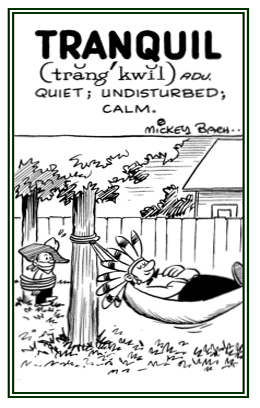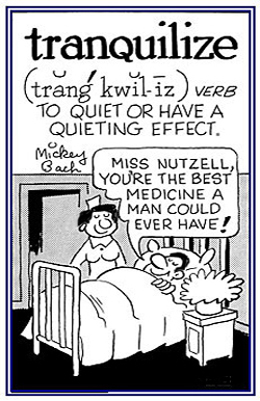trans-, tran-, tra-
(Latin: across, through, over, beyond; on the far side of)
Don't confuse the tra- in this element with another tra- in "drag" or "draw". Trans- becomes tra- before the consonants -d, -j, -l, -m, -n, and -v.
teletranscription
The transcription of a television program with the use of videotape.
traduce (verb), traduces; traduced; traducing
1. To speak evil of, especially falsely or maliciously; to defame, to malign, to vilify, to slander, or to misrepresent: The word traduce is one of a number of English synonyms which can be chosen when someone wants a word that means "to injure by speaking ill of".
2. To harm the reputation of someone through false and malicious statements: The newspaper columnist was obviously traducing, or defaming, the politician in her newspaper column.

© ALL rights are reserved.

© ALL rights are reserved.
Go to this Word A Day Revisited Index
2. To harm the reputation of someone through false and malicious statements: The newspaper columnist was obviously traducing, or defaming, the politician in her newspaper column.
A jealous rival attempted to traduce the mayor's reputation with false allegations of corruption.
3. Etymology: "to alter, change over, transport"; from Latin traducere, "to change over, to convert"; originally "lead along or across, transfer"; from trans-, "across" + ducere, "to lead".The sense of "defame, slander" (1586) is from Latin traducere with the meaning of "to scorn" or "to disgrace"; probably from the notion of "to lead along as a spectacle".


Go to this Word A Day Revisited Index
so you can see more of Mickey Bach's cartoons.
traducer
Someone who attacks the reputation of another by slander or libel; in other words: a defamer, a slanderer, a calumniator.
traject (verb), trajects; trajected; trajecting
1. To transport (move people or things), transmit (send from one person to another one), or transpose (change the order or position).
2. Etymology: from Latin trajectus; past participle of tracere, "to cast, to throw over" or "to throw across"; from tra-, a variant of trans- + -jec-, a combining form of jacere, " to throw".
2. Etymology: from Latin trajectus; past participle of tracere, "to cast, to throw over" or "to throw across"; from tra-, a variant of trans- + -jec-, a combining form of jacere, " to throw".
trajection
trajectory
1. The high curving line or path in which a moving object; such as, a missile travels through the air or space under the action of given forces including thrust, wind, and gravity.
2. The way in which a process or event develops over a period of time representing the long-term behavior of a procedure.
3. The path followed by a seismic wave as during an earthquake.
2. The way in which a process or event develops over a period of time representing the long-term behavior of a procedure.
3. The path followed by a seismic wave as during an earthquake.
trance
tranquil (adjective); tranquiler, more tranquil; tranquilest, most tranquil
1. A reference to a place which is peaceful, quiet, and calm: After coming home from work, Greg sat in his lawn chair and enjoyed a tranquil evening in his garden.
2. Descriptive of a person's mind which is serene and composed: Eugenia felt quite tranquil after having an agreeable and delightful conversation with her mother.
3. Etymology: from Latin trans-, "through, across" + quies, "rest, quiet".

© ALL rights are reserved.
Go to this Word A Day Revisited Index
2. Descriptive of a person's mind which is serene and composed: Eugenia felt quite tranquil after having an agreeable and delightful conversation with her mother.
3. Etymology: from Latin trans-, "through, across" + quies, "rest, quiet".

Go to this Word A Day Revisited Index
so you can see more of Mickey Bach's cartoons.
tranquility
tranquilize (verb), tranquilizes; tranquilized; tranquilizing
1. To calm or to relax someone by the use of a drug before or after a medical procedure: An aesthetic agent was used to tranquilize and to soothe Jane before her tooth was extracted by the dentist.

© ALL rights are reserved.
Go to this Word A Day Revisited Index
Fred's doctor tranquilized his son before the tonsil operation.
2. Etymology: from Latin trans-, "over, beyond" + quies, "rest, quiet."
Go to this Word A Day Revisited Index
so you can see more of Mickey Bach's cartoons.
tranquillise (British)
tranquilliser (British)
1. The condition of serenity, calmness, and peacefulness: Mary and Greg found the tranquility of village life more relaxing and comfortable in comparison to their hectic and stressful lives at work in the city.
2. Etymology: from Latin tranquillus, "peace, quiet, calm, still."

© ALL rights are reserved.
Go to this Word A Day Revisited Index
2. Etymology: from Latin tranquillus, "peace, quiet, calm, still."

Go to this Word A Day Revisited Index
so you can see more of Mickey Bach's cartoons.
tranquillize (U.S.)
tranquillize


